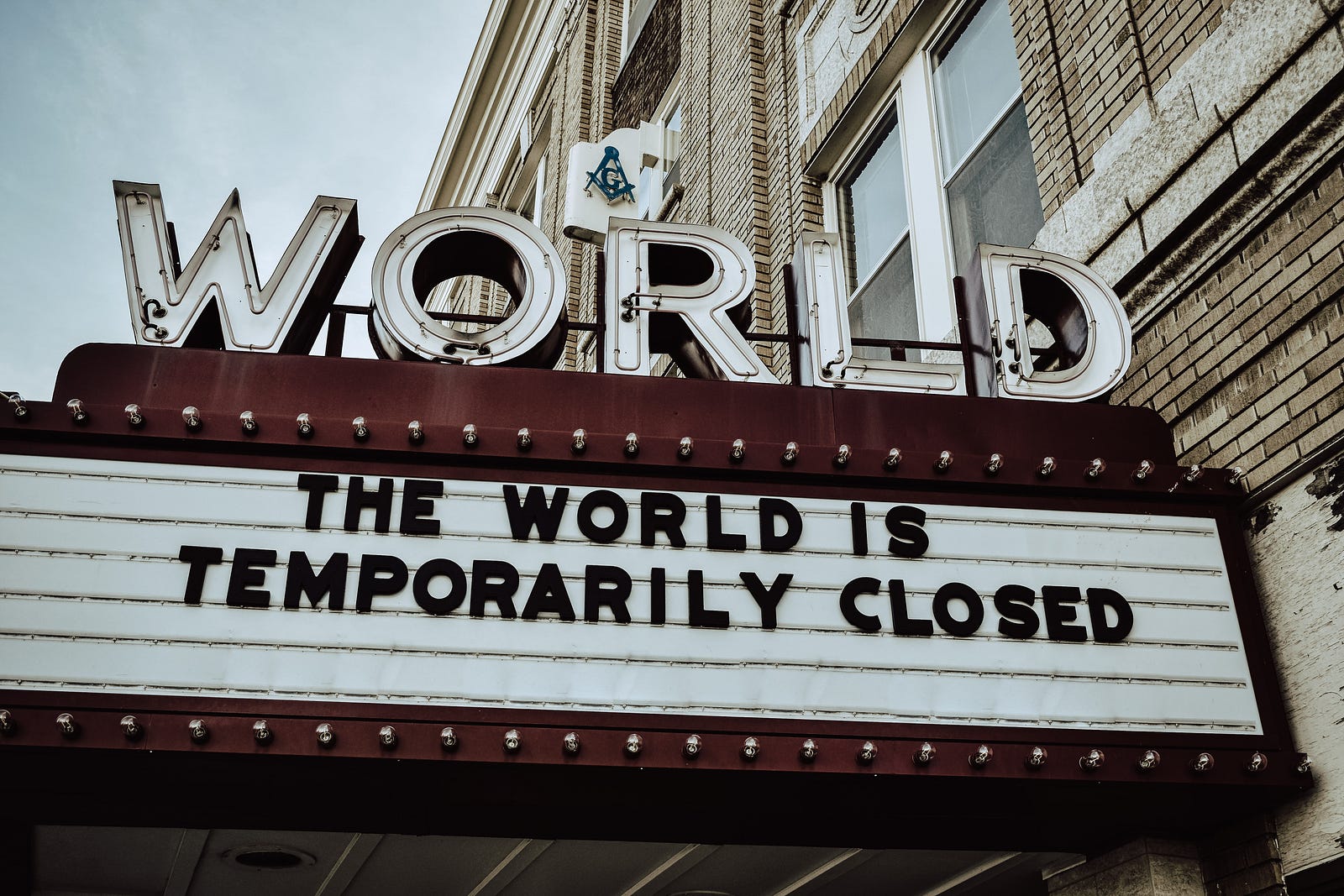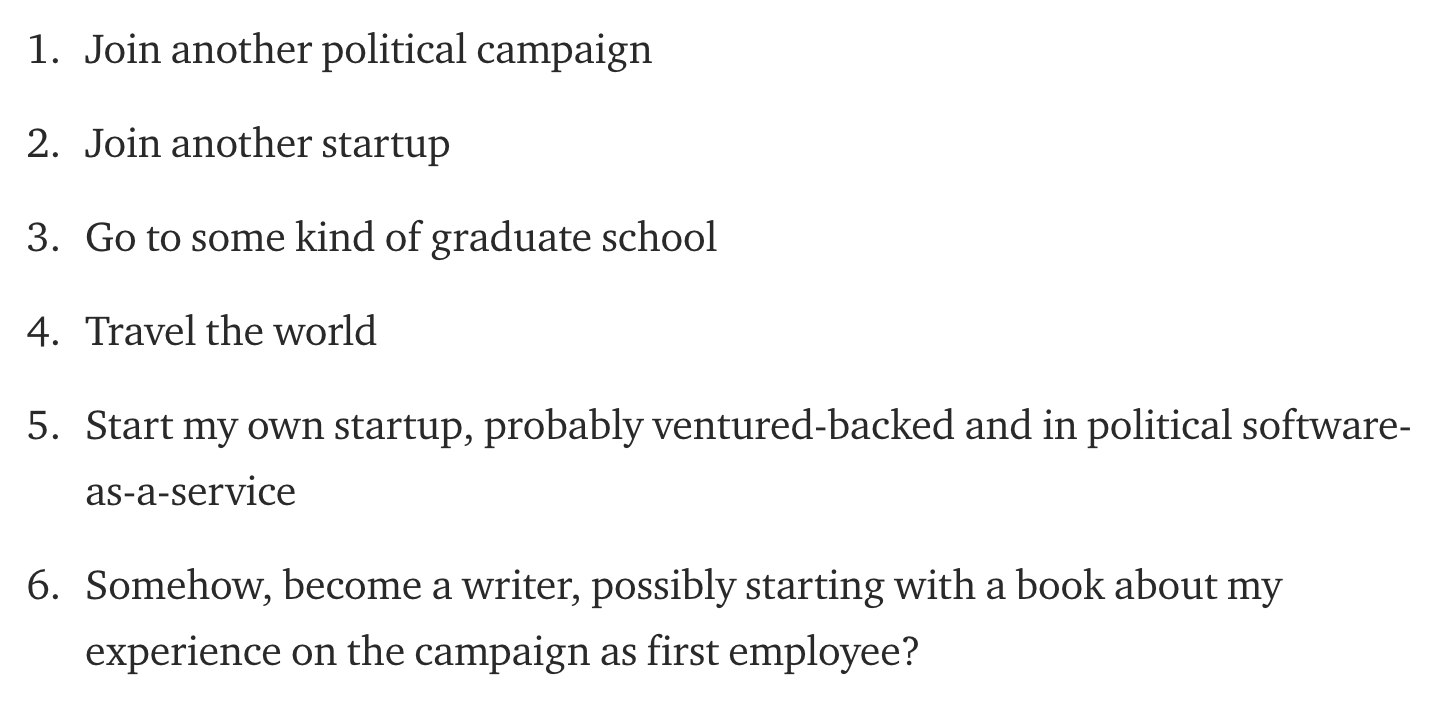My name is Muhan Zhang, and I’m the founder and editor of Startup Investing for All. Startup Investing for All (or ‘In For All’ for short) started as a personal blog in 2018 that I eventually monetized as a premium newsletter and community for angel investors. I launched the paid newsletter in August 2020, five months after leaving my last job in an unrelated field, and now have dozens of Internet strangers paying to read my thoughts on startups, venture, and entrepreneurship. If I hit my growth goals by the end of year, I’ll be able to say with a straight face that I make a living as a writer, eighteen months after starting.
For anyone that knows me, this latest development in my career is pretty unbelievable. I was in politics before, and before that, education technology and facial recognition. Although things sound neat and tidy in retrospect, never in my wildest dreams could I have predicted my journey leading me to media entrepreneurship and angel investing. This is why I hope to share my story forthrightly as a young professional with a large, unorganized set of interests outside of the traditional career paths. If you’re reading this essay, chances are good I sound familiar and you’re in a similar situation. If you make it to the end, I’ll even share with you ‘this one weird trick’ that helped me as I fumbled in the dark to make a dramatic, ambitious career switch. Now that I’ve designed a job that is both custom-fit for me, and has legs to support me economically, I hope my experiences can serve as a resource to anyone contemplating similar moves.
Without further ado, let’s dive into it.

The Journey
To recount this journey fairly and accurately, it helps to take stock of what I had before making the leap. After leaving my last job, I was a young professional with a very public and early win in entrepreneurship, running an amateur blog on the side, in addition to a couple successful investment properties. This didn’t really affect my thinking at the time, as my blog had been a completely unremarkable hobby for two years, with a few dozen free subscribers, and my investment properties were only making a few hundred dollars in cash flow every month.
How I spent my free time was slightly more interesting, but again, nothing that strange. I was and remain an aggressive reader of nonfiction in my free time, specifically, self-help, and have finished over 200 books throughout the last eight years. Of note, In 2018, I read Meg Jay’s ‘The Defining Decade,’ which posited that at any given moment, any individual has realistically six viable options in their work and life. Looking back on my journals, here were the six options I wrote for myself in June 2019 after the political campaign, from most realistic to most idealistic:
- Join another political campaign
- Join another startup
- Go to some kind of graduate school
- Travel the world
- Start my own startup, probably ventured-backed and in political software-as-a-service
- Somehow, become a writer, possibly starting with a book about my experience on the campaign as first employee?
On a similar theme, my high school friend Tony recommended Bill Burnett and Dave Evans’ excellent book ‘Designing Your Life’ (DYL) to me in January 2020, of which the majority of my career ideation was modeled after. All in, this was the backdrop of my mind in March 2020, as New York City went into lockdown the week after my last day on the campaign.

Naming the Deepest Desire
Once lockdown started in March, I spent a couple weeks vegging out. I played lots of video games, caught up with friends, cooked leftover groceries from my evacuated roommates, and wrote some Medium articles about my experience on the campaign.
By April, I began to do the DYL exercises in earnest. For a month, I took a daily meticulous log of every activity I did in a ‘Good Time Journal’, my energy/engagement level from that activity, and any insights I consequently drew. The major takeaway I got after a month of activity logging was that I was happiest living in the world of ideas: learning through audiobooks and Internet rabbit holes; providing insight through consulting and mentoring; and creating new things like recipes and analogies. Armed with that anchor insight, I ‘Mind Mapped’ various job titles that would primarily consist of my favorite activities, such as becoming a professor of entrepreneurship, tech journalist, or advisor/investor for startup companies. Lastly, I then set about mapping 3–5 year ‘Odyssey Plans’ for various life arcs. The insight from these exercises began a slow burn that would become a burning realization of “what I truly liked to do” versus “what I thought I liked doing.”
By May, I started ‘prototyping’ these insights through ‘Designing Your Life’ interviews with friends who were in the professions I was curious about. The interviews were as insightful as they were reassuring, with juicy one-liners like the following:
- A filmmaker confirmed for me that, as advertised, working professionally in a creative field genuinely supported her creative ambitions.
- A graduate student taught me that graduate school is still a job, and sadly, the learning that job entails is very narrow in scope.
- A successful entrepreneur taught me that advising startup companies is a job for after you become rich.
- A venture capitalist taught me that starting a venture fund is more administration than investing in companies.
- A freelance journalist taught me that a career in journalism requires the development of a brand surrounding one’s writing.
- A podcast host taught me I never want to rely on advertisement as a business model.
Finally, by June, the culmination of all this work began to have concrete impact in my decisions. Wrestling with all the things I had learned in my career and this insight-heavy safe exploration, I finally admitted to myself that I wanted to pursue a career in media e.g. ‘getting paid to explore ideas.’ Subsequently, I began to close doors: I deferred on applying to grad school, stopped trying to talk myself into starting a political technology startup, and started testing my vision with friends. Soon, I was exploring a podcast collaboration with a friend, writing more of my book proposal, while also putting more time into the blog.

Monetize and Grow
In July, I met up with some entrepreneurial friends to experiment with coliving and coworking abroad as a pod. My days were mainly spent writing my book proposal, advising startups, and feeling the existential weight of going down this uncertain path. Long-term, I schemed about applying for unpaid internships at NPR, Gimlet Media, and TechCrunch, after the world got its arms around COVID.
Fast forward to August, as luck would have it, my sister forwarded me a newsletter featuring a startup I had written about. Notably, this newsletter had an ad — paid for by the aforementioned startup — soliciting investment in their business. Having done the legwork to articulate that I wanted a media career a couple months ago, being hit with this news was like a slap in the face: I was already in media, and the topics I wrote about already had a vibrant readership and market, I simply hadn’t thought to monetize. From there, my product development instincts kicked in: I sent out a Google Form to ask my readers if they’d be interested in a premium newsletter, set up a payment system, and sold my first $20/mth subscription 24 hours after launching. After customer one, I set a goal of 10 subscribers by October, a symbolic goal I felt would prove sustainable growth. I got 3 more customers in September, 6 more in October, and have grown ever since.

Updates after sailing into the sunset
It’s been a year since I finished my last job, half a year since I got 10 customers, and 2 months since I got 20. In case you were wondering, I still can’t believe this is now my life.
My job, in essence, is to read and learn about whatever fascinates me, whenever and from wherever I want, with colleagues who pay me to work together. Our community is a decentralized, global organization of independent thinkers and investors, teaming up together to find, assess, and financially back startup companies. All this then gives me a plausible excuse to write long-form essays about startups, investing, and entrepreneurship (like the one you’re reading,) on the assumption that some small percentage of the audience reading this essay will recognize yourself in the description above and eventually pay me to join the investment community. Although my readership is still modest, I have a strong vision for scaling the business and achieving profitability by end of year.
Most importantly, for my friends and colleagues reading who have seen me intermittently along the journey, I want to confirm that the pot of gold at the end of the rainbow is real. I love my day-to-day life, and have a realistic plan for profitability. If I fail, or find myself hating this job in the next 18–36 months, I’m sure I’ll publish a Medium post about that too. But for now, this really does feel like the last and final job — no more, ‘doing this for a few years so I can do what I really want’ garbage that we’ve been taught. The DYL exercises helped me name the unspeakable desire — a job I’d do if I didn’t have to worry about money and didn’t worry about failing — and they’ve held up marvelously in the year since I first did them. Working in the end-game ‘job,’ I feel settled in a way I never have before in my career.
That is why, aside from the shameless pursuit of more paid subscribers, I wanted to share some last outstanding points in the spirit of being authentic and real:
When did you feel this was real enough to say you were working full-time?
If I was a reasonable human being, I probably would have felt comfortable at ten subscribers. But because I still wrestle with fixed mindset and scarcity, I didn’t feel confident enough to publish this essay and take this stand until getting 20 customers in January. Even then from there, it took me 2 more months to get over my perfectionism and imposter syndrome. Hitting the one year anniversary of my last job, along with committing to an experimental content strategy this month finally helped bring this essay to market.
Does your ethnic and racial identity inform this journey?
The longer I worked in startups and entrepreneurship, the more I learned to code-switch between corporate speak and my ethnic culture. When I explain my business model to Chinese aunties and uncles, I explain it as a ‘online club for rich people.’ Further, when winning over the biggest stakeholder of them all, my mother, I leaned into the only metric she cared about: profitability. Just as my mother doesn’t actually know what a management consultant or investment banker does, only caring that they make good money, setting goals for revenue and then consistently hitting them silenced most complaints. Between ten and twenty subscribers is when she stopped asking about my numbers.
Are there any pleasant surprises you’ve found after this journey?
First and foremost, the Design Your Life exercises exceeded all possible expectations and helped me create a business unlike any I’ve ever seen. I have the business model of a media company that looks like an angel syndicate, while writing educational content for colleagues that vote with their dollars. Unlike traditional investment structures, I don’t have to worry about K-1 distributions for my investors or endless legal fees. Unlike a traditional media company, I don’t have to worry about advertising cause my audience is rich and willing to pay. Unlike most writers, I have more autonomy and flexibility about where/when I publish because the community around my writing is just as valuable as the writing itself. As someone who used to roll his eyes at the ambiguous process of design thinking, I’d encourage any skeptic to try it: after all, you only have to be right once.
Secondly, the best-kept secret of my startup investing journey is that it made me a better founder and professional. My angel investing philosophy in a nutshell: don’t pitch me anything pre-product, pre-revenue, and ideally sell something that’s complex for business people (read: moat), light on physical assets (read: software, marketplaces, enterprise analytics, insurance, or air), with great recurring revenue. Sound familiar?
Lastly, outside of benefits to my entrepreneurial skill, the network of my readers is incredible. The fact that I get to shamelessly market myself in service of finding more of them is outlandish. Founders, investors, and professionals of an unfathomably thoughtful caliber flock to me because I’ve built a platform and brand (read: more non-physical assets) based on truthful learning in public. My first customer paid me solely because I asked, before I even had a product. Even if I had started a venture-backed software startup, I can’t imagine how the networking opportunities could ever beat media.

Conclusion
I turned twenty eight at the end of last year, and for my birthday, my mother and I went to dim-sum together. In reflecting on 2020, we were both stunned by where I landed. Over some shrimp dumplings and shumai, she asked “did you know this is what you wanted to do after the campaign?,’ to which I gave her a summarized version of this essay, including the 6 paths from Meg Jay’s ‘The Defining Decade.’ Upon hearing the six, she responded, ‘Wow, you took your three top options, traveling, entrepreneurship, and writing, and mashed them into one.’

I’ve been blessed by incredible luck, and for that I feel grateful multiple times a day. At the same time, I hope my post has presented a credible, forthright account of the journey, back when I didn’t know what the ending would be. I’m not the dimmest bulb in the shed, but I’m not the brightest either: I truly believe for someone similar, contemplating similar dreams, that replicating what I did is very possible. Sadly, I know lots of people who are unsatisfied with their career. You probably do too. Taking the time to document my process is my humble protest now that I strongly know it doesn’t have to be that way.
To the professionally satisfied, stuck, or otherwise curious: I am not telling you to quit your job to become an underwater basket weaver. In fact, my self interest runs deeper than that: if studying ambitious people doing ambitious things combines the best of both safety and learning, then I would contend that investing in startups is the greatest leverage you can apply for your career and society.
Imagine being able to grill ambitious founders everything about their livelihood: how much money they needed to build a product, how they chose their business, and then literally see their finances year by year in their quest to make a living doing what they love. There’s startups for anything and everything: kelp meat, financing for Ugandan entrepreneurs, camp sites for nomads living the van life, digital billboards on rideshare mobiles, and big data to help authors write more profitable books are some highlights from just what I see in a month. Everyday, my subscribers and I have a blast talking about founders, funders, and the real people doing unreal things. Now that I’ve found my next step, I delight in supporting and systematizing others finding theirs. If any of the above sounds like something you’d be interested in, I hope you take time to take action — you know where to find us.

Muhan Zhang is the founder and editor of Startup Investing for All, a premium community for angel investors seeking better returns, together. Previously, he was employee number one and Chief Operating Officer of the Andrew Yang 2020 campaign for president. He writes at www.muhanzhang.com about founders, funders, and real people doing unreal things.

